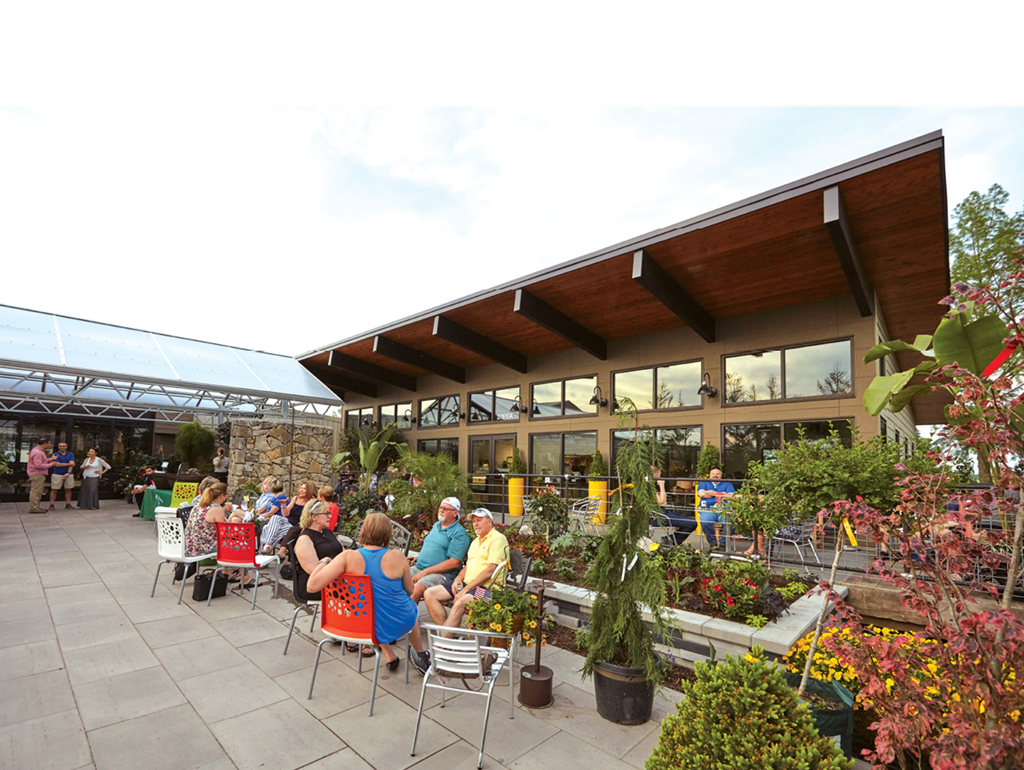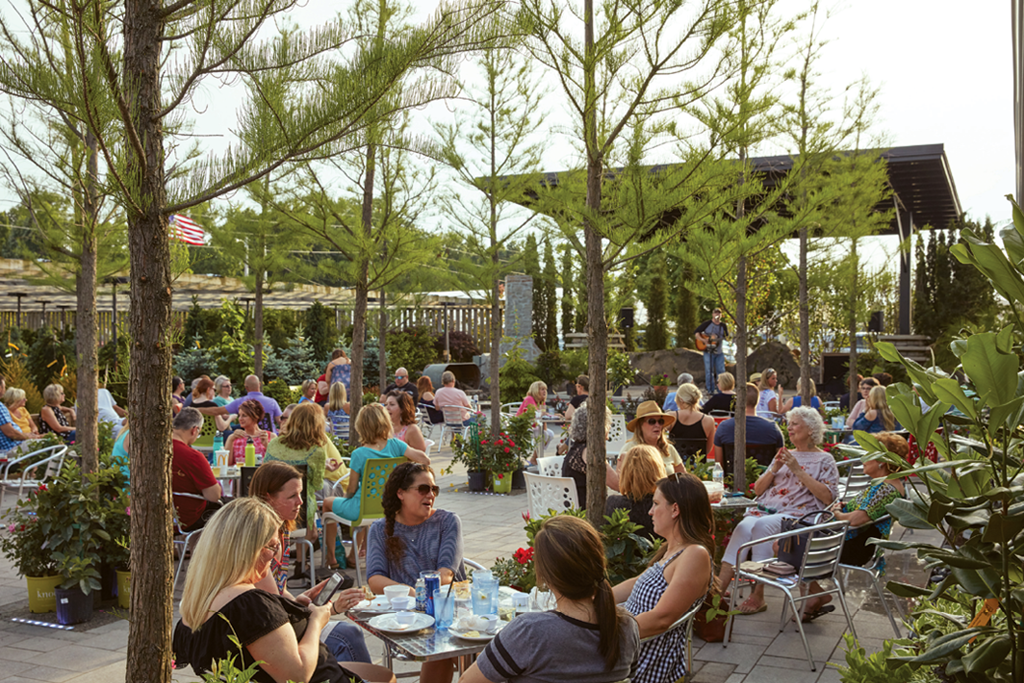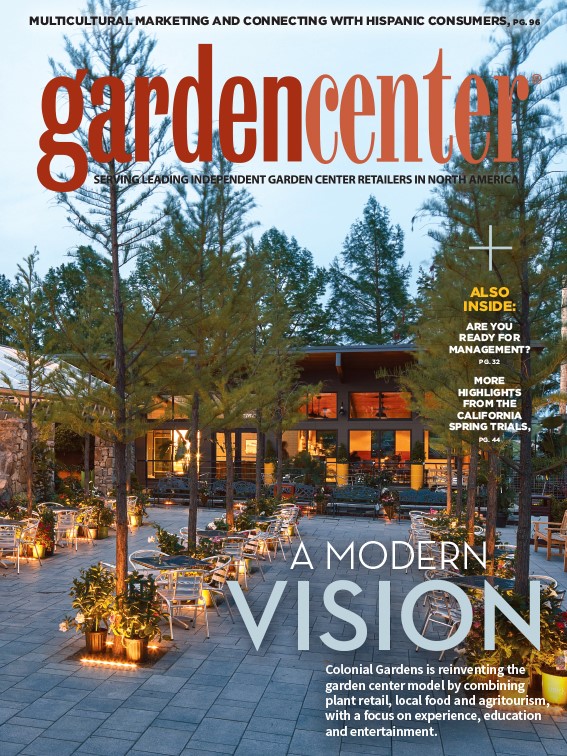

Tory Schwope says his most cherished childhood memories are from when he worked alongside his dad and uncle on their hobby tree farm. He grew up on Schwope Brothers Tree Farms, pruning suckers and pulling weeds, and it was where his passion for the horticulture industry was cultivated.
When Schwope was 9 years old, his father and uncle — who had separate, full-time jobs as a mechanic and salesman, respectively, sold the farm to a retail garden center in Blue Springs, Mo., called Colonial Nursery, and Schwope was devastated. The elementary school-aged boy vowed that one day, he would reclaim and restart the business his family sold.
About 20 years later, Schwope followed through on his goal, purchasing the business and reestablishing Schwope Brothers Tree Farms in 2005, just six years after he graduated from college.
About a decade later, he ended up buying Colonial Nursery, too.


An unlikely acquisition
Despite owning nine separate horticulture brands under the parent company Schwope founded called DCA Outdoor, which includes Schwope Brothers and recent acquisitions like Brehob Nursery — an Indiana-based wholesale nursery and landscape distributor — tree production has always been Schwope’s passion. Landscape distribution is the most successful segment of DCA Outdoor, and he never thought he would own a retail garden center, nor did he want to.
“You know, of all the businesses that I’ve been in or observed, the independent garden center business has to be the hardest one,” he says. “The real reason we started looking at [the Colonial Nursery] facility was we wanted to add another landscape distribution center on this side of the city. I mean, that was the reason why I wouldn’t buy it forever and ever. I didn’t know what to do with the retail, and I didn’t know what to do with the field.”
He was with his kids at a pumpkin patch when an idea struck him.
“I saw agritourism growing like crazy as an industry. I see all this demand for local food, and then all of a sudden it dawned on me: I don’t want to be in the agritourism business. I don’t want to be in the garden center business,” Schwope says. “I could certainly see being in both because they’re counter-cyclical, right? I mean, you could put them together, and now you have a totally different business.
“This is a business, something new and something exciting. So, I said, ‘OK, I’ll spend some time and I’ll invest in that.’”




Custom-built
Schwope purchased Colonial Nursery, which included 50 acres, in February 2016, and after two years of renovations, the company celebrated its grand reopening as Colonial Gardens during what was a snowy spring this past April. Because the store was open in 2017 during construction, some customers were able to watch the transformation.
Before, Colonial Nursery looked and operated like a traditional garden center, with retail, landscaping, irrigation and wholesale divisions. The business grew annuals and perennials in greenhouses across from the property. Now the garden center, which was established in 1969, has changed both aesthetically and philosophically.
The architectural style of the new building is Modern Prairie with a monoslope roof, which is complemented by the striking tropicals and bedding plants growing within it. The indoor retail space is illuminated with natural sky lights and soft LEDs and lined with reclaimed wood — giving it a warm, rustic but modern feel. There are some traditional departments, like birding and a beautifully merchandised miniature gardening area.
Then, there are the elements you don’t find at many garden centers. A local market at the front of the store is stocked with produce (grown in Colonial greenhouses once used for annual production,) locally sourced meat, cheese, eggs and more. The building is air conditioned and includes a classroom for workshops and seminars and comfortable restrooms.
Outside the store is a lathe house where nursery stock is sold through a satellite location of KAT, the nursery-turned-landscape-distribution company Schwope started in his early 20s. High-quality materials from KAT, including Techo-Bloc pavers, were used to construct the store’s courtyard, which also features a stone fireplace and outdoor stage. Colonial hosts special events, seminars, and soon, weddings, there, plus the space serves as inspiration for landscape design customers who want to purchase materials. The Bean Counter Café, owned by Sara O’Bryan, who leases the on-site restaurant, can also be accessed from the courtyard.
What exists at Colonial Gardens today is just the first phase of what Schwope hopes will become an entertainment and agricultural destination. Driving around the 80-acre grounds, Schwope points to open fields that will be future features, like an amphitheater for outdoor concerts and other events that can host 1,000 people, a “you cut” field for customers to create their own fresh flower bouquets and to harvest bulbs, and a site where he hopes to build an office building and lease commercial space.
He also hopes to add more land in the future to create garden plots that customers can rent. Though it may seem overwhelming at first, all of the segments of Colonial Gardens are part of what Schwope believes garden centers need to be successful in the 21st century. Instead of repurposing outdated or unused spaces to meet the demands of changing consumers, he’s custom-building Colonial Gardens to meet the needs of current and future customers.



A new model for garden centers
Colonial Gardens is undergoing both physical and philosophical changes.
The focus is food — whether customers want to grow their own vegetables and herbs, learn how to garden at one of three to five weekly seminars and workshops offered, shop for Colonial branded basil and carrots to cook at home or premade food at the local market, pick their own apples, peaches, apricots or berries from what will be “you pick” fields, dine surrounded by trees, annual beds and combination planters at The Bean Counter Café, or celebrate sweet corn and salsa during summer harvest festivals.
Also in the works is a six-week fall festival with a different attraction each week, including activities for kids, various musicians and a beer garden. In December, the courtyard will transform to the Winter Wonderland, with Christmas trees, hot chocolate and a visit from Santa.

The food focus is apparent from some of the other features, too, like the aquaponics system set up right in the greenhouse, or the information on pollinators displayed near rows of plants.
“At Colonial Gardens, you can experience food at any level. If you’re not interested in growing a garden or you’re not interested in cooking, you can still come in to eat,” Schwope says. “… But if you like to garden, we’ll help you through how to grow. We just want to create an avenue where you can intersect with food at any different level that you want.”
Schwope’s mission to “reinvent the retail nursery business by introducing events, entertainment, food and local agriculture to the traditional garden center model” also makes Colonial less vulnerable to the seasonality of the retail garden business, as there will be events that follow the bounty of each season.
But he is concerned that customers may be confused by all that Colonial Gardens offers.
Gradually developing the site and slowly introducing customers to the revamped store is key, and one way they expose people to the new Colonial Gardens is by hosting free events, such as Wine Wednesday, where customers can sit on the patio, hear local musicians and explore the new garden center and all that Colonial Gardens has to offer in an informal environment. Interest — and sales — have been strong so far.
Keri Lauderdale Olson, senior director of marketing and agritourism, who develops and executes Colonial Gardens’ events, educational curriculum and more, said that while Wednesdays are typically slow, 26 percent of the day’s sales happen during Wine Wednesday, which is held from 6 p.m. to 9 p.m. Staff stick around to answer questions and man registers.
“Because people are asking questions, while they may not buy that night, we’re seeing them back the following week to explore,” she says.






Leadership philosophy
Overseeing the nine businesses that DCA Outdoor encompasses is manageable because Schwope leaves the details to a talented team of experts. He keeps his focus on the company vision and hiring the right people.
“I’m not very good at running a business. I’m the builder. All of my companies are based on what’s called EOS [Entrepreneurial Operating System.] It was laid out in a book called ‘Traction: [Get a grip on your business],’” he says. “The biggest thing that I learned from EOS, that was different than what I was taught about business in school or anywhere else, is that most small- to medium-sized businesses should have two people at the top. One person’s job or title is to be the visionary, to have ideas to chart a path of where we want to go, to handle big relationships, to basically create the vision for the company, to play a role in the culture. And the other position at the top is called the integrator, the integrator runs the company. Their job is to develop the business plan and the processes and manage the results.”
By focusing on the vision of the brands under DCA Outdoor, and hiring trusted, talented integrators to manage the businesses, Schwope has been able to grow the business as a whole and is “poised to continue this expansion,” he says.



Schwope’s leadership team at Colonial includes Keri Lauderdale Olson. “Senior director of marketing and agritourism” is a title you don’t see often at garden centers, and her day-to-day responsibilities include everything from writing marketing materials, to surveying customers for workshop and seminar feedback, to getting the local market up-and-running, which included finding vendors and acquiring food and liquor licenses.
Schwope spent nine months searching for the perfect person to fill the role, because it’s essential to the mission — giving customers a meaningful experience and offering several opportunities for people to connect with agriculture and food, whether that’s through a workshop, a concert or a festival.
When Lauderdale Olson, who has a background in marketing and event planning, read the description, she says, “I felt that it was written for me.” But she grew up in Blue Springs — she went to school with the kids of the former Colonial Nursery owners — so she wasn’t sure how the business would transform or what to expect from the new owner.
“Even though [Colonial Gardens] is already an established business, it’s almost like a startup,” she says. “I think it’s very insightful that Tory has the vision to treat it like a startup so we can try new things, we can test them, and we can build upon them.”
Another trusted adviser to Schwope is Kevin Keilig, director of greenhouse and nursery operations, who, with the help of staff, maintains a meticulous greenhouse.
“I train them, [and explain that] if you wouldn’t buy a plant, pull it. Studies show that once a customer sees a bad plant, it’s 10 feet before they’ll look at anything else,” Keilig says. “As plant people, you hate to throw anything away, but sometimes, you need to.”
Alan Platz, operations manager, is another essential member of the team and has worked at Colonial Gardens for more than 30 years. He says he “loves” the updates. Even Platz’s dad, Wayne, who lives across the street and used to co-own Colonial Nursery, visits the store three to five times a week and took photos as construction progressed.
“I wasn’t a real big change person, so I was kind of scared [of the future changes] at first, but it’s just been great to watch the changes over the last year and a half,” Platz says. “It needed a facelift, it really did. I like the openness of the building now. It was pretty sectioned off before.”
He takes informal surveys of customers — watching their facial expressions as they first walk in and asking them what they think of the changes. He says most are happy with the new store, but are also relieved to see familiar faces, experts like Platz and Gary Lyngar, who has worked there for more than 40 years.
Schwope is involved in operations and guiding principles, however. For example, when constructing the greenhouse, he made sure the loading dock was right outside of the back exit so that trucks could easily move in and out and plants could be brought in and set up quickly. Schwope also insists on selling only plants that will do well in the Kansas City-area climate.



Repurposing old materials is also a non-negotiable for Schwope, who purchases old military vehicles, like the 8x8 semiaquatic “Colonial Cruiser” he plans to use for marketing, driving it at parades and hayrides during fall festivals.
“A lot of the wood that’s on the [retail store] walls were trees that were in the way at the farm … [or from] a barn that was falling down. For our bioswale, we used old tires for the retaining wall and used old rubber tracks for annual planting beds,” says Schwope, who also expanded a pond that was on the property to use for water storage. “It’s crazy to think about how much waste we produce in this country, so I try to be a little bit more creative in how we can repurpose everything.”
Lauderdale Olson says it’s inspiring how excited both the Colonial staff and customers are about the transformation of Colonial Gardens and the future changes in the works.
“We built a pretty cool facility, and we brought together a really great team of people. We’ve got an opportunity to achieve our goal," Schwope says. "[But] you can’t just snap your fingers and it happens. The whole idea is to create an experiential environment where people can connect with green infrastructure, local food gardening — all of these things in one closed loop, one continuous circle. And the hope is that over time, they associate Colonial Gardens with healthy, good-for-the-planet and the right way to do horticulture, whether it’s in your lawn or on your dinner plate.”





Explore the June 2018 Issue
Check out more from this issue and find your next story to read.
Latest from Garden Center
- Star Roses and Plants launches redesigned website
- Weekend Reading 10/18/24
- Star Roses and Plants wins awards from 2025 American Garden Rose Selections testing program
- High Country Gardens sponsors International Hummingbird Society debut program
- Proven Winners announces new director of product development
- Floral associations push Congress for cost-saving measure
- American Horticultural Society unveils $5 million endowment at River Farm gala
- PHS announces 2025 PHS Philadelphia Flower Show theme: 'Gardens of Tomorrow'





